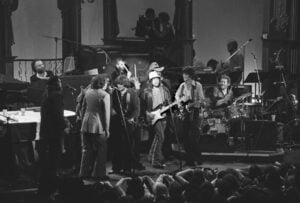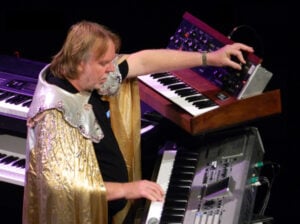Arguably The 4 Gods Of Classic Rock Guitar
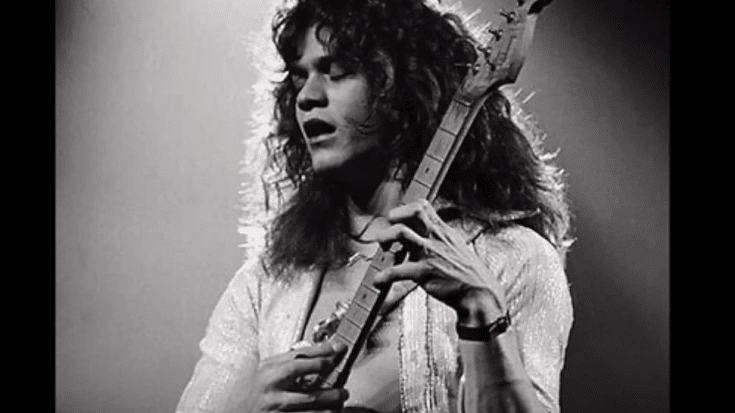
via Van Halen Backing, Isolated, and Live Tracks / YouTube
America has seen many great Presidents, but only four are immortalized on Mount Rushmore. Similarly, in rock music, there are countless legendary guitarists, but only a select few have truly reshaped the landscape. While iconic names like Tony Iommi, Eric Clapton, Jeff Beck, and Pete Townshend are often in the conversation, only four can be considered the “Big 4” of rock guitar. Here are the four guitarists who have made the most significant impact on rock music and inspired generations of musicians.
Keith Richards
Keith Richards’ unmistakable style is one of the main reasons the Rolling Stones have maintained their status as one of the most successful and enduring bands in rock history. Alongside Mick Jagger, Richards co-wrote nearly all of the Stones’ biggest hits, becoming a symbol of rock and roll. He’s also famous for his spontaneous creativity—legend has it that he wrote the legendary riff for “(I Can’t Get No) Satisfaction” in his sleep. While he is often celebrated for his rhythm guitar work, Richards’ lead guitar shines on classics like “Sympathy for the Devil,” where he also plays bass.
If you asked Richards, he might place someone else at the top of the list. “Chuck [Berry] is the granddaddy of us all,” Richards once told Rolling Stone in 2017. He believes that even if a rock guitarist does not cite Berry as a direct influence, their influences undoubtedly do. Richards helped elevate rock to new creative heights with his diverse range of influences on tracks like “Gimme Shelter,” “Jumpin’ Jack Flash,” and “Miss You.”
Throughout his career, Richards has played alongside three unique guitar partners—Brian Jones, Mick Taylor, and Ronnie Wood—each bringing different flavors to the Rolling Stones’ music. This collaboration resulted in a catalog that stands unmatched in its depth and quality. And Richards is still rocking. In 2023, he, Jagger, and the band released Hackney Diamonds and embarked on another successful U.S. stadium tour.

Jimi Hendrix
Jimi Hendrix’s entry into the rock scene was nothing short of revolutionary. “After Pete Townshend and I went to see him play, I thought that was it, the game was up for all of us,” Eric Clapton once admitted, reflecting on his awe after watching Hendrix perform.
After working as a sideman for artists like Little Richard and the Isley Brothers, Hendrix moved to London in 1966 and transformed rock guitar playing. His use of feedback, distortion, and effects like the wah-wah pedal on tracks such as “Hey Joe,” “Purple Haze,” and “The Wind Cries Mary” was groundbreaking. His innovative approach created songs like “Are You Experienced?” that still sound futuristic over 50 years later. Yet, Hendrix was not just a rock guitarist; he was a master of the blues, evident in his soul-stirring acoustic performance of “Hear My Train A Comin’.”
Though Hendrix’s career was cut short, releasing only four albums before he died in 1970, his blend of rock, blues, soul, and psychedelia reshaped music forever. His influence remains so profound that nearly every recorded session or concert he ever performed has been released in some form.
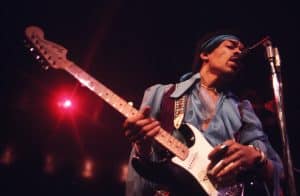
Jimmy Page
Before founding one of the most legendary rock bands of all time, Jimmy Page honed his skills as a top session musician. When he took over a struggling version of the Yardbirds, he reshaped it into Led Zeppelin, which became a pioneering force in hard rock history.
“I wanted Zeppelin to be a marriage of blues, hard rock, and acoustic music topped with heavy choruses,” Page explained in a 1993 Guitar World interview. This blend had never been done before, and the synergy among Page, Robert Plant, John Bonham, and John Paul Jones brought his vision to life. Page’s intricate riffs and solos were at the center of Zeppelin’s music, whether on tracks like “Whole Lotta Love” or “Kashmir.”
Page’s studio genius was also a key factor in Led Zeppelin’s success. He produced all their albums, employing innovative techniques like reverse echo and unique microphone placements. His mastery led to a unique sound that set Zeppelin apart. Though Page has kept a low profile since Zeppelin disbanded in 1980, his impact is undeniable. “Jimmy Page, to me, is the consummate guitarist,” KISS’s Paul Stanley said. “He’s not rock or metal; he’s true world music.”
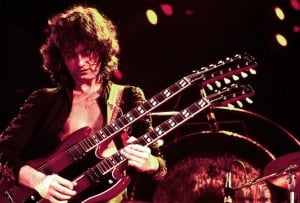
Eddie Van Halen
In the late ’70s, as punk and disco began overshadowing rock, Eddie Van Halen burst onto the scene, forever changing the way rock guitar was played. Like Hendrix, he reinvented the guitar’s language, particularly through his popularization of the tapping technique, which involves using both hands on the neck of the guitar.
His 1978 instrumental “Eruption” became the gold standard for guitar solos, providing a new blueprint for generations of guitarists. But Van Halen wasn’t just about flashy solos; he integrated his virtuosity into memorable, well-crafted songs that became both fan and critic favorites. His band’s experience playing diverse covers on the club circuit honed their songwriting skills, allowing them to blend Eddie’s dazzling technique with pop hooks and tight arrangements.
Tony Iommi recognized this when he said, “The way that Ed plays is very different. He came up with a style that’s been imitated a million times.” Eddie also experimented off-stage, customizing his guitars and amplifiers to achieve better sounds. His quest for perfection led Van Halen (the band) to groundbreaking successes, including their first No. 1 hit, “Jump,” which prominently featured keyboards—a decision that revolutionized hard rock music in the ’80s. Eddie Van Halen’s relentless guitar innovations made him one of rock’s most vital figures.








